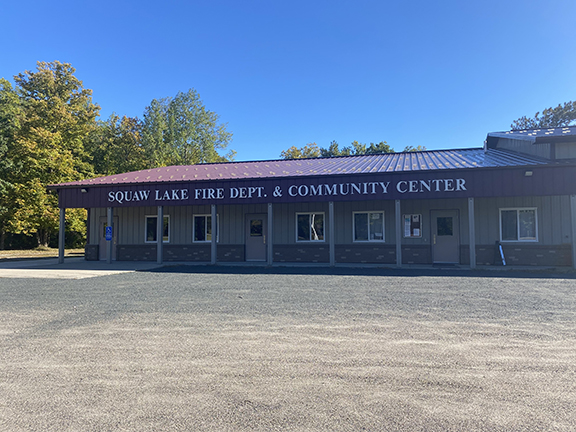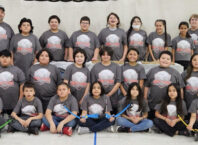By Dan Ninham
In a press release from the U.S. Department of Interior on September 8, it was announced the Board on Geographic Names (BGN) voted on the final replacement names for nearly 650 geographic features with the word “squaw” on them. The final vote completes the last step in the historic efforts to remove a term from federal use that has historically been used as an offensive ethnic, racial and sexist slur, particularly for Indigenous women.
“I feel a deep obligation to use my platform to ensure that our public lands and waters are accessible and welcoming. That starts with removing racist and derogatory names that have graced federal locations for far too long,” said Deb Haaland, the first indigenous Secretary of Department of Interior who is an enrolled member of the Laguna Pueblo Tribe in New Mexico.
A Pine County lake in Minnesota was recently renamed to remove the derogatory term. The lake has been renamed Manidoons Zaaga’igan Zhaawanor, meaning East Bug Lake in the Ojibwe language.
Squaw Lake, MN is a town in Itasca County that is on the northern most area of the Leech Lake Ojibwe (LLBO) reservation map. It was incorporated as a village in 1940 although there was a post office there in 1923. The Great Northern Railway had a station there and it was also a hub for fur traders and logging interests, and currently has a hunting and fishing economy. There are three churches, one motel, one bed and breakfast, six resorts and 12 privately owned businesses, and none are native owned. The population was 98 in the 2020 census with a racial demographic of 57.55 American Indian, 35.85 White, 6.60 Two or More Races, and no other races.
There is no word in the Ojibwe language that translates to the word “squaw”. Ojibwemowin for the town is translated to Gaa-waawiyegamaag in the Ojibwe Peoples Dictionary but this means Round Lake, on the western side of the town. Nature’s Lake is on the eastern part of the town and was renamed in 1995 from Squaw Lake during the action of the Minnesota Legislature.
In the print edition of the Minnesota Public Radio story “MPR: Squaw Lake Resists Name Change” by Tom Robertson on April 30, 2001, the story addressed how Squaw Lake residents resisted a name change 21 years ago, while other similar place names were being replaced. A group of Cass Lake-Bena HS students and staff were instrumental in influencing the Minnesota Legislature to pass a law eliminating the “squaw” word from 19 geographic place names in the state. One of them was the former waterway Squaw Lake, now called Nature’s Lake.
Joan LeCuyer, a white citizen of Squaw Lake, came from Minneapolis to her new home town in 2005. She has been the Mayor since 2016. She said, “That’s the way it has been … Squaw Lake. I don’t feel uncomfortable with it. There are a lot of town people that don’t feel uncomfortable with it. If there’s advertising, the full name of Squaw Lake should be on it.”
Although the racial demographic of the town is indigenous majority, the city council has never had an indigenous mayor and Vi Bellanger was the only indigenous council person. In the 2001 MPR story, she was outspoken in support of the town name and still stands firm in her thinking. When recently asked if she still believes in what she was quoted in the MPR story, she said “Has not changed, my dear!!”
There are several others in the majority indigenous town folk who think the same. The thought process is multi-generational with the distinct pride mode of being “Squaw Lakers”.
“I was never really offended by it,” said Breanna Mittenen, LLBO member and Squaw Lake resident. “I would respect those who didn’t like it, and would refer to it by S. Lake when in their presence. Otherwise, I would still use Squaw Lake.”
“My grandma used to say that it’s just the name of the town, would you change your name if your last name was Hooker? I also never heard anyone using it in a derogatory way, so that is partially why I was never offended,” added Mittenen.
“The thing with systems of oppression, like settler colonialism, is that they have an insidious way of reproducing and reinventing themselves generation after generation,” said Bonnie McGill, PhD, Carnegie Museum of Natural History. “Normalizing the use of a derogatory word like the ‘S-word’ is woven into the fabric of settler colonialism, which altogether normalizes violence and oppression of Indigenous people, including dispossession of their lands.”
“Many Indigenous cultures use place names as reminders of ancestral knowledge, and names are a way to connect the past, present, and future through place and language. Settler colonizer culture does not work that way,” added McGill.
Gary Charwood, LLBO member and resident of S. Lake, is the chairperson of the Local Indian Council (LIC). He and his immediate family have been non-supportive of the town place name for decades. The extended family had mixed feelings.
“Squaw Lake School is a part of the Grand Rapids School District,” Charwood said. “There was a public forum where the town people met with district officials to talk about the school name. The native people in the town were strongly in support of the name. Our daughter’s great-grandmother told her that even though she showed support of the town and school name that she really didn’t support it.”
The school name was changed to Eagle View School in 2003 largely due to the public forum. The school district eventually closed the school in 2007.
“All are entitled to their own opinion,” said Charwood. “It won’t change anytime soon, but it will, when the elders stand up over the elderly and the young ones start understanding who they are.”







